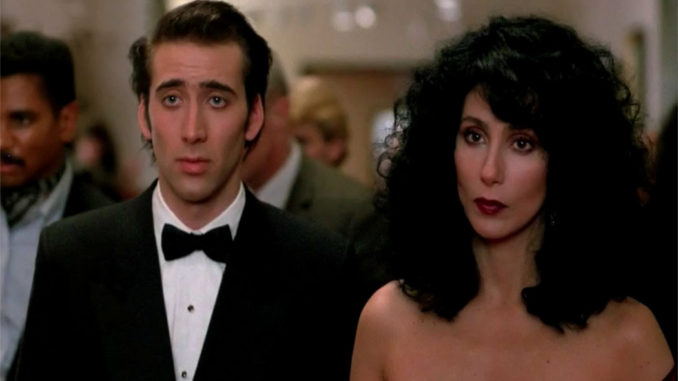
“Moonstruck” (1987)
“WHEN THE moon hits your eye like a big pizza pie/That’s amore.” So sings Dean Martin in the iconic love song that opens this 1987 romantic comedy, and “Moonstruck” seems to have sprung directly from those words. Under the influence of a shining full moon, an Italian-American family in New York find themselves entangled in a series of romantic knots as the film shrewdly examines love from a multitude of angles.
At its center is the superstitious Loretta (Cher, in an Oscar-winning performance), a widow convinced that her failure to have a “real” wedding led to her first husband’s premature death via bus accident. Her boyfriend Johnny (Danny Aiello) is a nice man who has done all the right things — proposing on his knees, agreeing to a real wedding, etc. — but one whom Loretta freely admits she doesn’t truly love. She followed her romantic instincts the first time around, and that only got her hurt — better to play it safe than risk more pain. That is until she runs into Johnny’s estranged brother Ronny (Nicolas Cage), a one-handed baker full of fiery passion, and sparks fly.
Meanwhile Loretta’s parents, Cosmo and Rose (played by Vincent Gardenia and Olympia Dukakis, both of whom were nominated for Academy Awards), are mired in their own problems, as their marriage threatens to fall apart.
The romantic light of the moon touches everyone differently, and ultimately the film is not attempting to show one right way to love, but rather it’s exploring and embracing the various ways that love impacts us: pain and joy, bliss and despair. That this film is so thoughtful in its approach to romance makes it a perfect Valentine’s Day watch, and it’s uproariously funny to boot.
“A New Leaf” (1971)
Following in the vein of the Howard Hawks films of the late ’30s, “A New Leaf” is one of the truly great screwball comedies made after the classical Hollywood era. The always excellent Walter Matthau plays Henry Graham, a wealthy man-child who has managed to blow his entire inheritance fund, and, unwilling to give up his luxurious lifestyle, is now faced with two options: suicide or marriage to a wealthy bride. An opportunity presents itself in the form of Henrietta Lowell (Elaine May, who also writes and directs), a kind-hearted but dangerously ditzy botanist who also happens to be sitting on a heap of inherited cash.
Henry is one of cinema’s most memorable dopes — a man of despicable moral character and preposterous imbecility, but one who nonetheless manages to grab a hold of the viewer’s sympathy. Famously, the original cut was nearly three hours long and considerably darker than the version we have today, especially with regard to Henry, but Paramount, already frustrated with May for going so far overbudget, seized control of the picture and pared it down significantly. We will likely never know the true nature of that lost footage, but the film in its current form is still a scathing social commentary and one of the strongest entries in the American rom-com tradition.
Valentine’s Day viewers of all types will find something to like here, as the ending can be read either as satirical horror or as affirmation that even the most unlikely of people can find true love.
“Trouble Every Day” (2001)
Not for the faint of heart, this erotic horror film from French master Claire Denis is one of the more viscerally upsetting works ever put to celluloid. Newlyweds Shane (Vincent Gallo) and June Brown (Tricia Vessey) travel to Paris, ostensibly on honeymoon, but we slowly learn that Shane has another reason for making this trip. As he digs deeper into his past, a vampiric plot of a deeply troubling nature begins to unfold.
Denis doesn’t typically shy away from transgression, but her elliptical, tactile style of filmmaking tends towards the gentle and serene, even when dealing in subject matter that is less so. Conversely, “Trouble Every Day” is often revoltingly violent, taking the sexuality implicit in vampire stories and literalizing it to a grotesque degree — carnality meets cannibalism.
Why, then, might this blood-soaked flick suit a holiday dedicated to cushy romance? The answer can be found beneath the layers of voracious gore and animalistic brutality, where lies an oddly moving look at the intersection of love and lust and a legitimate, albeit perverse, romanticism — that is, if you can stomach it.
Subscribe to the Mossy Log Newsletter
Stay up to date with the goings-on at Lewis & Clark! Get the top stories or your favorite section delivered to your inbox whenever we release a new issue.

Leave a Reply